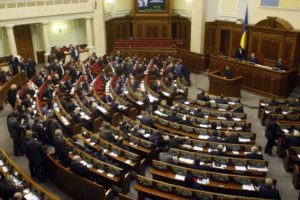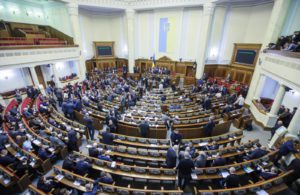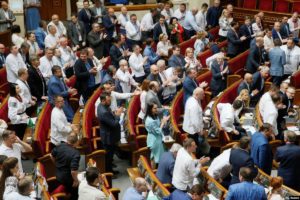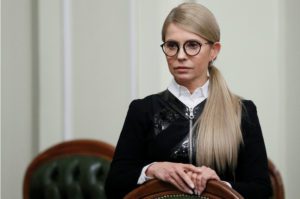
The session of the Verkhovna Rada of the ninth convocation, according to the law, should take place no later than September 10, the parliament staff predict that the newly elected members of parliament will gather as soon as possible after the elections. After voting at the extraordinary elections of the Verkhovna Rada on July 21, the Central Election Commission (CEC) should within 20 days publish official results in the official newspapers Holos Ukrainy and Uriadovy Kurier with the list of elected parliamentarians.
According to the legislation, the Verkhovna Rada meets for the first session in the hall of the parliament no later than on the 30th day after the announcement of the voting results.
Thus, the first session of the parliament should take place before September 10.

President of Ukraine Volodymyr Zelensky has sent to the Verkhovna Rada of Ukraine a bill amending some laws of Ukraine on cutting electricity tariffs.
The document was registered in the parliament on June 26. The text of the bill has not been made public.
As reported, representative of the head of state in the Ukrainian government Andriy Gerus said that Ukrainian President Volodymyr Zelensky initiated the legislative change of the Rotterdam+ formula by the Rotterdam- formula in order to reduce electricity tariffs. He said that according to the document, the cost of shipping coal from Rotterdam to Ukraine should be removed from the formula. In addition, it is proposed that discounts be introduced if the quality of coal is worse. The bill also provides for a delay in the introduction of the electricity market for one year.

Five parties can enter the parliament, and more than half of Ukrainians intend to vote in early elections. Those are the results of a survey conducted by Ukraina TV channel Sehodnia (Today) ezine with the Edison Research. The field research of the survey was conducted by the Kyiv International Institute of Sociology.
Survey results, which were published by on Sehodnia’s website, show five parties can enter parliament: Servant of the People, Opposition Platform – For Life, European Solidarity, Holos and Batkivschyna.
Four more parties which have a chance of surpassing the five percent barrier are Strength and Honor, Opposition Bloc – Peace and Development Party, Oleh Liashko’s Radical Party and Civil Position.
The survey was conducted by Edison Research by telephone and personal interview in all regions of Ukraine, except for Russia-occupied Crimea and Russia-occupied parts of Donbas.

More than 70% of respondents surveyed by sociologists have said they support the idea of dissolving the Verkhovna Rada and holding early parliamentary elections, according to a poll conducted by the Rating sociological group on May 16-21, 2019 and published on Wednesday. At the same time, the highest level of support for the dissolution of parliament and the holding of early elections is in the South and the East of Ukraine which is more than 80%. In other regions, the dissolution of the Verkhovna Rada is supported by at least 60% of the respondents.
“There is a certain difference in the attitude to the holding of early elections among the supporters of the Petro Poroshenko Bloc’s Solidarity Party, most of whom are against this initiative,” the release of the Rating says.
The audience of the survey is the population of Ukraine who is older than 18 years. The sample is representative by age, gender, region, and type of settlement. The sample of population is 2,000 respondents, who were interviewed by means of face-to-face talk. An error of representativeness of the study is no more than 2.2%.

Leader of the parliamentary faction Batkivschyna Yulia Tymoshenko proposes to begin consultations on the creation of a new coalition in the Verkhovna Rada.
“I think that now we need to hold the main discussion about whether there will be extraordinary or next ones – we still have half a year to restart – we need to start a discussion about creating a new coalition in parliament and creating a new government of Ukraine with a completely new strategy and tactics of governing the country,” Tymoshenko said at a meeting of the conciliatory council of faction leaders and parliamentary groups on Monday.
She noted that, otherwise, time will be lost and chaos will continue, which today, according to the politician, exists in the country.

Ukrainian Parliament passes law on green auctions for investors in green energy
KYIV. April 25 (Interfax-Ukraine) – The Verkhovna Rada at a plenary session on Thursday passed bill No. 8449-d on green auctions for investors in renewable energy. A total of 251 lawmakers baked the bill amending some Ukrainian laws regarding ensuring competitive conditions for production of electricity from alternative energy facilities.
The document proposes the introduction of auctions from 2020 and the obligatory participation for investors in solar power plants with a capacity of more than 1 MW and wind farms with a capacity of more than 5 MW (or one turbine).
The pilot auction should be held no later than December 31, 2019, and the ProZorro electronic trading system is proposed to be the platform for the auctions. The period of granting a guaranteed tariff for transmission of electricity by the winner of the auction is 20 years.
The project assumes that the size of quotas to be put up for auction, according to the Cabinet of Ministers, is approved by the Ministry of Energy and Coal Industry. During the first three years it is planned to provide wind farms and solar power plants with 30% of quotas, after this period – at least 15%.
Responsibility of producers of renewable energy facilities for misbalances is proposed to be introduced after the intra-day market is recognized as liquid, but no later than 2024.
It is proposed to reduce the current feed-in tariff for solar power plants in 2020 by 25%, and in 2021-2023 – by 2.5% annually.
For wind farms with a capacity of more than 2 MW, the tariff is proposed to be reduced in 2020 by 10% without further annual reductions.
The tariff for energy generated from biomass and biogas is proposed to be maintained at the current level.
For household solar power plants, the tariff is planned to be reduced by 10% from 2020 (currently it is EUR 0.18 per kWh). Before the start of the voting, the deputies returned the amendment, which introduces the condition for its receipt, the installation of a solar power plant up to 50 kW on roofs, facades of buildings and other hard-wall facilities.